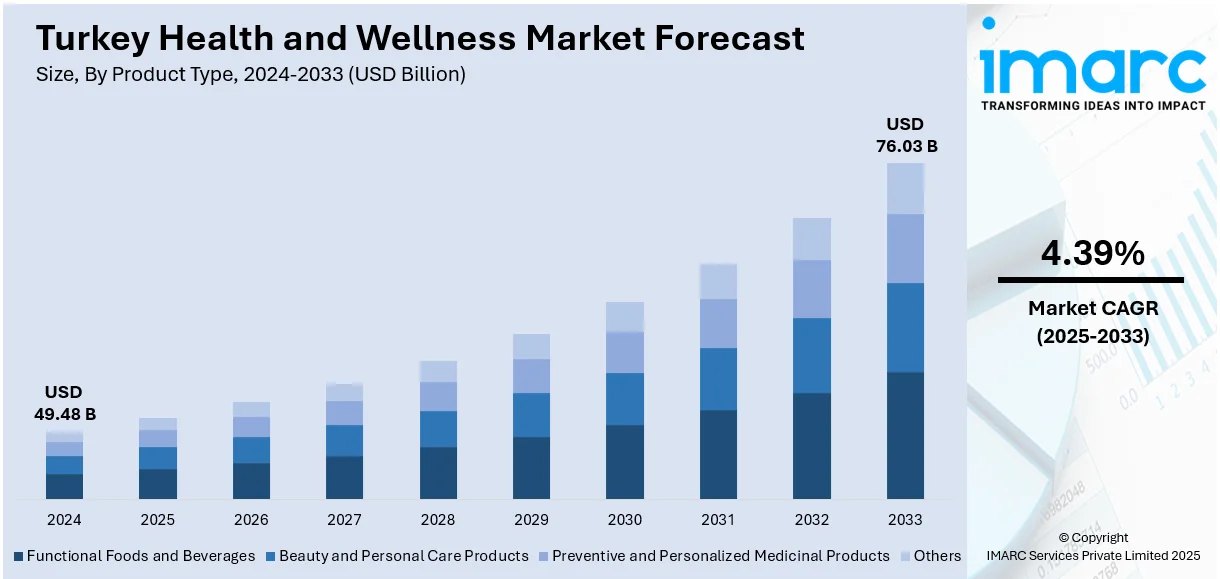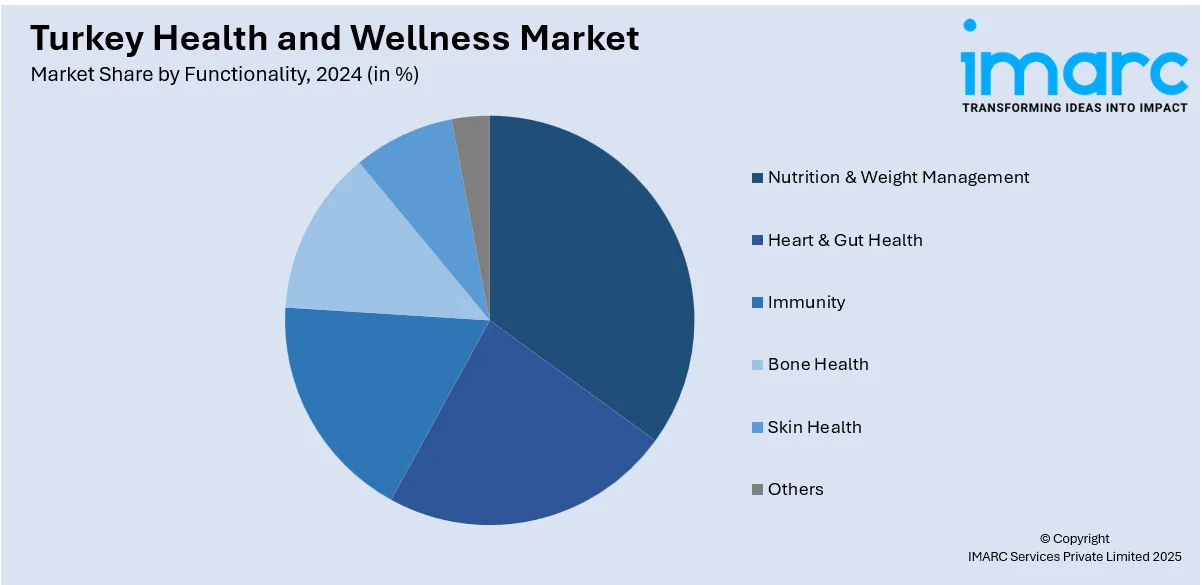
Turkey Health and Wellness Market Size, Share, Trends and Forecast by Product Type, Functionality, and Region, 2025-2033
Turkey Health and Wellness Market Overview:
The Turkey health and wellness market size reached USD 49.48 Billion in 2024. Looking forward, the market is expected to reach USD 76.03 Billion by 2033, exhibiting a growth rate (CAGR) of 4.39% during 2025-2033. The market is fueled by increased consumer demand for preventive medicine, especially in terms of functional and herbal supplements like immunity-enhancing probiotics and customary herbal formulas. Digital fitness and telemedicine services are expanding at a quick pace, as technology-embracing users incorporate online portals into exercise regimens, virtual training, and mind-wellness counseling. Turkey is also becoming a leading medical tourism destination, capitalizing on low-cost wellness checkups, and thermal wellness retreats such as Turkish hammams and thermal baths, which are further driving the growth of Turkey health and wellness market share.
|
Report Attribute
|
Key Statistics
|
|---|---|
|
Base Year
|
2024
|
|
Forecast Years
|
2025-2033
|
|
Historical Years
|
2019-2024
|
| Market Size in 2024 | USD 49.48 Billion |
| Market Forecast in 2033 | USD 76.03 Billion |
| Market Growth Rate 2025-2033 | 4.39% |
Turkey Health and Wellness Market Trends:
Revival of Ancient Turkish Wellness Rituals
The health and wellness industry in Turkey is richly enhanced through the revival and modernization of its ancient wellness rituals, including the sacred Turkish hammam experience, regional medicinal herbs, and natural thermal springs. Hammams are being transformed into new-generation spa-and-wellness complexes throughout Istanbul, Bursa, and the Aegean coast, combining ancient cleansing rituals with up-to-date amenities like aromatherapy, body scrubbing, and mud baths. Hot spring resort communities such as Pamukkale, Yalova, and Afyonkarahisar have also diversified their products to provide holistic retreats that combine mineral-rich spring treatments with yoga, detox programs, and dietary education. They offer wellness and relaxation experiences for domestic health-seekers as well as foreign visitors seeking restorative and culturally rich wellness experiences. Regional herbal practices—such as linden, rosehip, and sage—used in wellness teas, bath products, and supplements are increasingly popular.

To get more information on this market, Request Sample
Digital Wellness and Telehealth Integration
Turkey is quickly adopting digital means into its wellness economy, with high internet penetration and mobile phone use driving adoption of telehealth and wellness coach sites. City dwellers in Ankara, Bursa, and Izmir are using online platforms for distant therapy sessions, structured fitness classes, and psychological counseling in Turkish. Startups have introduced mobile apps with custom exercise regimes, meal planning on locally available foods such as Turkish yogurt and olive oil, and meditation customized according to cultural settings. Moreover, telemedicine has penetrated rural places where specialized health care may be in short supply, and hence now the patients can see nutritionists or psychologists online. Turkish wearable devices that can monitor vitals, sleep, and stress are also becoming interconnected with wellness platforms to track health in real-time. These technology-influenced innovations complement Turkey's developing interest in preventive care, rendering wellness more mainstream and customized, and preparing the way for Turkey health and wellness market growth.
Functional Nutrition and Holistic Food Culture
Turkey's deep-rooted culinary culture is being redefined through the prism of health and wellness, as consumers become progressively interested in functional nutrition rooted in traditional food culture. Specialty coffee shops and health food outlets in Istanbul and Antalya are highlighting products such as probiotic culture-enriched kefir drinks, pomegranate, honey, and walnut bowls made with locally produced ingredients, and cold-pressed citrus juices infused with herbs from the Mediterranean region. Preparing workshops for ancestral wellness foods such as green lentil soup (mercimek çorbası), stuffed grape leaves with olive oil, and herbal teas from Anatolian flora are beginning to become readily available. These outlets prioritize nutritional transparency, educating attendees on how to incorporate classic dishes into a wellness-oriented diet. Turkish consumers, in particular millennials and Gen Z, are cultivating a taste for food that combines flavor, regional heritage, and wellness purpose. This trend is in line with an overall movement toward food-as-medicine, prompting manufacturers to diversify business lines in clean-label superfoods and nutrient-enhanced pantry staples, and infusing cultural sustenance with a focus on wellness.
Turkey Health and Wellness Market Segmentation:
IMARC Group provides an analysis of the key trends in each segment of the market, along with forecasts at the country and regional levels for 2025-2033. Our report has categorized the market based on product type and functionality.
Product Type Insights:
- Functional Foods and Beverages
- Beauty and Personal Care Products
- Preventive and Personalized Medicinal Products
- Others
The report has provided a detailed breakup and analysis of the market based on the product type. This includes functional foods and beverages, beauty and personal care products, preventive and personalized medicinal products, and others.
Functionality Insights:

- Nutrition & Weight Management
- Heart & Gut Health
- Immunity
- Bone Health
- Skin Health
- Others
A detailed breakup and analysis of the market based on the functionality has also been provided in the report. This includes nutrition & weight management, heart & gut health, immunity, bone health, skin health, and others.
Regional Insights:
- Marmara
- Central Anatolia
- Mediterranean
- Aegean
- Southeastern Anatolia
- Black Sea
- Eastern Anatolia
The report has also provided a comprehensive analysis of all the major regional markets, which include Marmara, Central Anatolia, Mediterranean, Aegean, Southeastern Anatolia, Black Sea, and Eastern Anatolia.
Competitive Landscape:
The market research report has also provided a comprehensive analysis of the competitive landscape. Competitive analysis such as market structure, key player positioning, top winning strategies, competitive dashboard, and company evaluation quadrant has been covered in the report. Also, detailed profiles of all major companies have been provided.
Turkey Health and Wellness Market News:
- In April 2025, Türkiye’s Health Ministry revealed intentions to implement extensive reforms in medical tourism, seeking to enhance the growing demand as well as expand the range of services provided—especially in aesthetic procedures, which attract a significant number of international patients.
Turkey Health and Wellness Market Report Coverage:
| Report Features | Details |
|---|---|
| Base Year of the Analysis | 2024 |
| Historical Period | 2019-2024 |
| Forecast Period | 2025-2033 |
| Units | Billion USD |
| Scope of the Report |
Exploration of Historical Trends and Market Outlook, Industry Catalysts and Challenges, Segment-Wise Historical and Future Market Assessment:
|
| Product Types Covered | Functional Foods and Beverages, Beauty and Personal Care Products, Preventive and Personalized Medicinal Products, Others |
| Functionalities Covered | Nutrition & Weight Management, Heart & Gut Health, Immunity, Bone Health, Skin Health, Others |
| Regions Covered | Marmara, Central Anatolia, Mediterranean, Aegean, Southeastern Anatolia, Black Sea, Eastern Anatolia |
| Customization Scope | 10% Free Customization |
| Post-Sale Analyst Support | 10-12 Weeks |
| Delivery Format | PDF and Excel through Email (We can also provide the editable version of the report in PPT/Word format on special request) |
Key Questions Answered in This Report:
- How has the Turkey health and wellness market performed so far and how will it perform in the coming years?
- What is the breakup of the Turkey health and wellness market on the basis of product type?
- What is the breakup of the Turkey health and wellness market on the basis of functionality?
- What is the breakup of the Turkey health and wellness market on the basis of region?
- What are the various stages in the value chain of the Turkey health and wellness market?
- What are the key driving factors and challenges in the Turkey health and wellness market?
- What is the structure of the Turkey health and wellness market and who are the key players?
- What is the degree of competition in the Turkey health and wellness market?
Key Benefits for Stakeholders:
- IMARC’s industry report offers a comprehensive quantitative analysis of various market segments, historical and current market trends, market forecasts, and dynamics of the Turkey health and wellness market from 2019-2033.
- The research report provides the latest information on the market drivers, challenges, and opportunities in the Turkey health and wellness market.
- Porter's five forces analysis assist stakeholders in assessing the impact of new entrants, competitive rivalry, supplier power, buyer power, and the threat of substitution. It helps stakeholders to analyze the level of competition within the Turkey health and wellness industry and its attractiveness.
- Competitive landscape allows stakeholders to understand their competitive environment and provides an insight into the current positions of key players in the market.
Need more help?
- Speak to our experienced analysts for insights on the current market scenarios.
- Include additional segments and countries to customize the report as per your requirement.
- Gain an unparalleled competitive advantage in your domain by understanding how to utilize the report and positively impacting your operations and revenue.
- For further assistance, please connect with our analysts.
 Request Customization
Request Customization
 Speak to an Analyst
Speak to an Analyst
 Request Brochure
Request Brochure
 Inquire Before Buying
Inquire Before Buying




.webp)




.webp)












